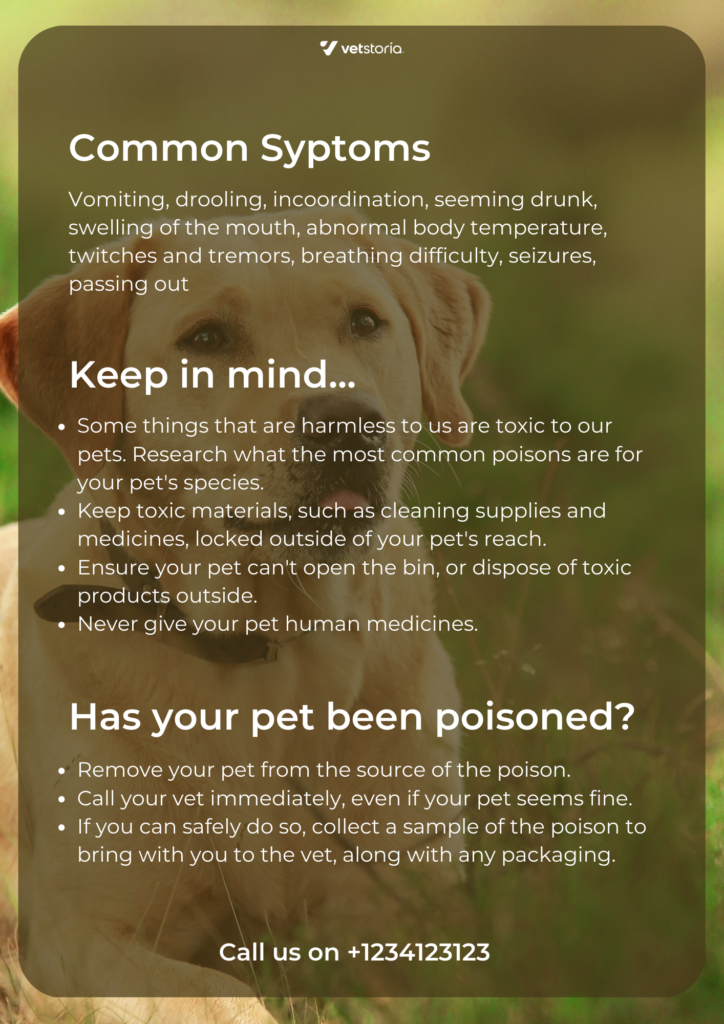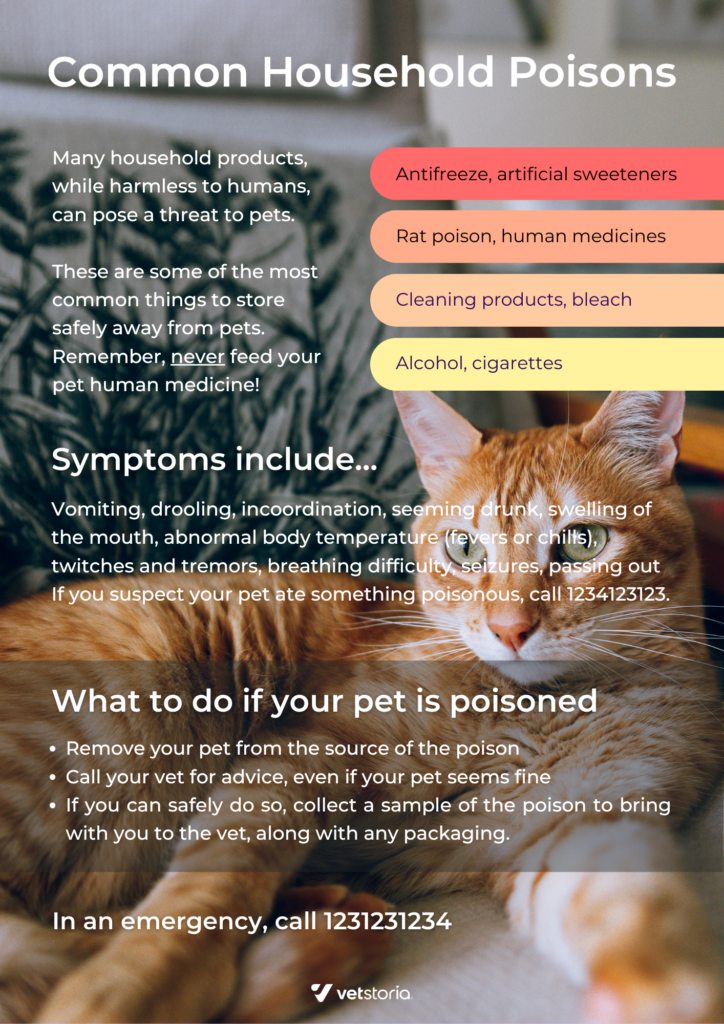How to Market Your Veterinary Clinic during Pet Poison Awareness Month
The importance of educating pet owners about pet poisoning
Table of Contents
- Introduction
- What are the common household pet poisons to avoid?
- What should pet owners know about pet poisoning?
- What does the pet poison content pack include?
- Download the Content Packs
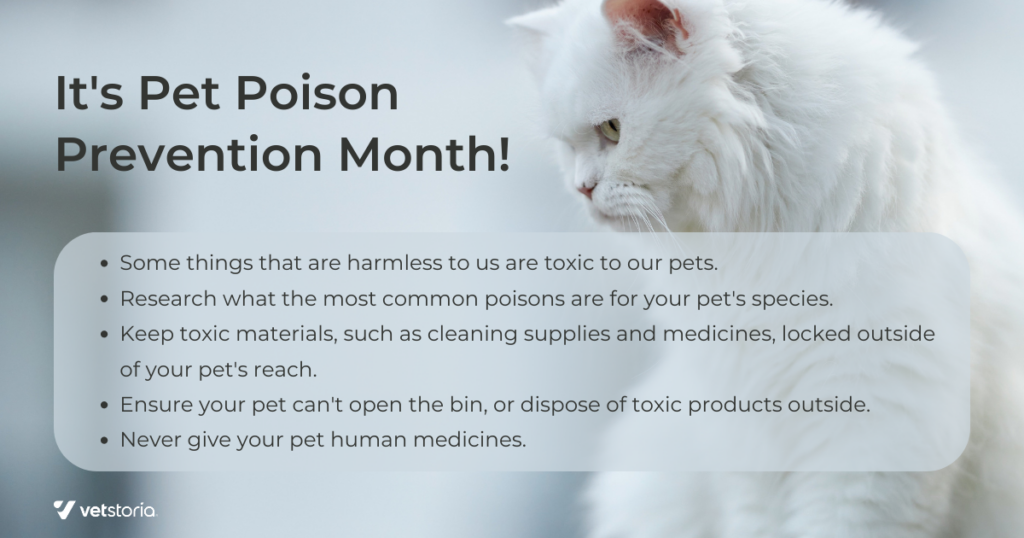
Introduction
March is National Poison Prevention month and as a veterinarian, it is a great opportunity for marketing your veterinary clinic whilst also educating pet owners about potential dangers in their homes that can poison their pets. It is also a good time to speak about what precautions they need to take to protect their pets which can also help immensely with veterinary marketing.
This month-long campaign was started by the Pet Poison Helpline in 2011 to help pet owners protect their furry friends from accidental poisoning. As a veterinarian, by supporting pet owners with this information you can build trust and loyalty.
Pets are curious creatures, and they love to explore their surroundings. Unfortunately, some of the everyday items we have in our homes can be toxic to pets, and exposure to them can lead to serious health problems or can even prove fatal. During Pet Poison Prevention Month, it is crucial to raise awareness among pet owners about common household items that can be toxic to their pets.
Pet poisoning can occur in a variety of ways, from ingestion of toxic foods and plants to accidental exposure to household chemicals and medications. While prevention is the key to keeping pets safe, it is important to recognize the signs and symptoms of pet poisoning and seek veterinary care if poisoning is suspected.
What are the common household pet poisons to avoid?
Some common household toxins that many pet owners are not aware of include:
Foods: Some human foods can be toxic to pets, such as chocolate, caffeine, grapes, raisins, onions, garlic and avocados. These foods can cause vomiting, diarrhea, seizures, and even death in some cases.
Medications: Human medications can be toxic to pets, such as painkillers, antidepressants, and blood pressure medications. It is essential to keep all medications out of reach of pets.
Household products: Household products like cleaning solutions, insecticides, and rodenticides can be toxic to pets. These products should be stored in areas where pets cannot access them.
Plants: Some common household plants can be toxic to pets, such as lilies, azaleas, and tulips. It is essential to research plants before bringing them into the home to ensure they are safe for pets.
Chemicals: Chemicals like antifreeze, paint thinner, and gasoline can be toxic to pets. These products should be stored in areas where pets cannot access them.
As a veterinarian, you can start by encouraging pet owners to keep their homes pet-friendly and safe by removing any items that could be harmful to pets. It is also important to advise pet owners to keep their pets away from any areas where these items are stored.
During Pet Poison Prevention Month, you can share information with pet owners about how to recognize the signs of pet poisoning as a veterinary marketing campaign. Some common symptoms are listed above. If pet owners notice any of these, they should contact their veterinarian immediately.
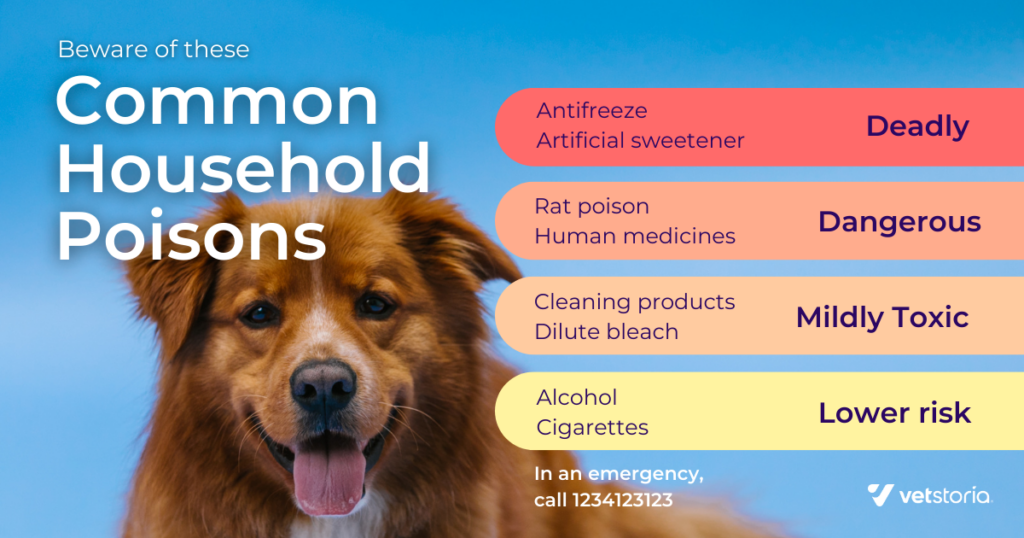
What should pet owners know about pet poisoning?
Pet owners should be aware of the signs and symptoms of pet poisoning, which can vary depending on the type and amount of toxin ingested. Some common signs of pet poisoning include:
- Vomiting
- Diarrhea
- Loss of appetite
- Lethargy
- Difficulty in breathing
- Seizures
- Abdominal Pain
- Excessive thirst or urination
- Bleeding or bruising
What does the Pet Poison Content Pack include to help you with veterinary marketing?
At Vetstoria, we have created these content packs for you to use to educate about Pet Poison Month to help you with veterinary marketing. Click here to download our packs here.
It is pretty simple.
Step 1: Choose the pack you want, and open the clickable template links. You will be directed to Canva, which allows you to customize the packs as per your brand guidelines.
We have also included suggested captions or content that you can use. You could also edit our copy or write your own material to suit the needs of your clinic.
Step 2: Export the design as it is, or add your logo, and brand colors, and update the text.
Step 3: Download the design for your digital channels, or print physical copies of our poster and flyer designs!
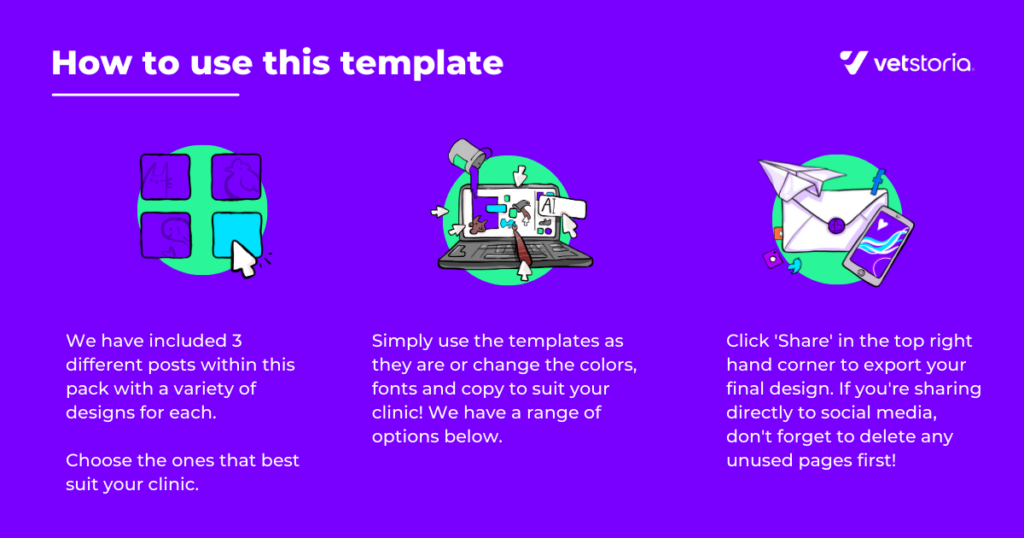
Our Pet Poison Prevention and Toxic Food for Dogs packs provide all the information you need for helping you with veterinary marketing in the form of:
Flyer– Utilizing your digital channels is great – but capturing clients when they’re in the clinic is an opportunity you don’t want to miss! Share these hand-outs with pet owners as they leave their appointment to help them keep their pet safe. You can use the one you like, change colours & font and make it look as per your liking. Once you are happy, you can download or print your design by clicking the ‘Share’ button in the top right corner of Canva.
Don’t forget to add a suitable Call to Action. This could be details of where to reach you for example, your phone number or email address. You can also use a QR code which will take your client to your website with more information in hand.
Poster– You can follow the same steps of creating a flyer mentioned above, to help you with posters. You can either use the information we have provided or edit it to write something else you feel is more important for your clients. Be as creative as you like!
Instagram Post– We have included different carousel templates and many independent posts, with suggested captions and titles, within this content pack. Our carousel templates are another handy way to connect with your audience on the platforms they spend time on. Share them in the feed and promote your new posts on your Stories to keep your clients well informed which is an excellent way for veterinary marketing!
Facebook Post– There are different templates available for a Facebook post with a variety of designs for each. Facebook is a great place to get in front of your clients, so why not take the opportunity to share some important tips? Our pre-made post and Facebook caption makes it easy for you to start connecting with your followers.
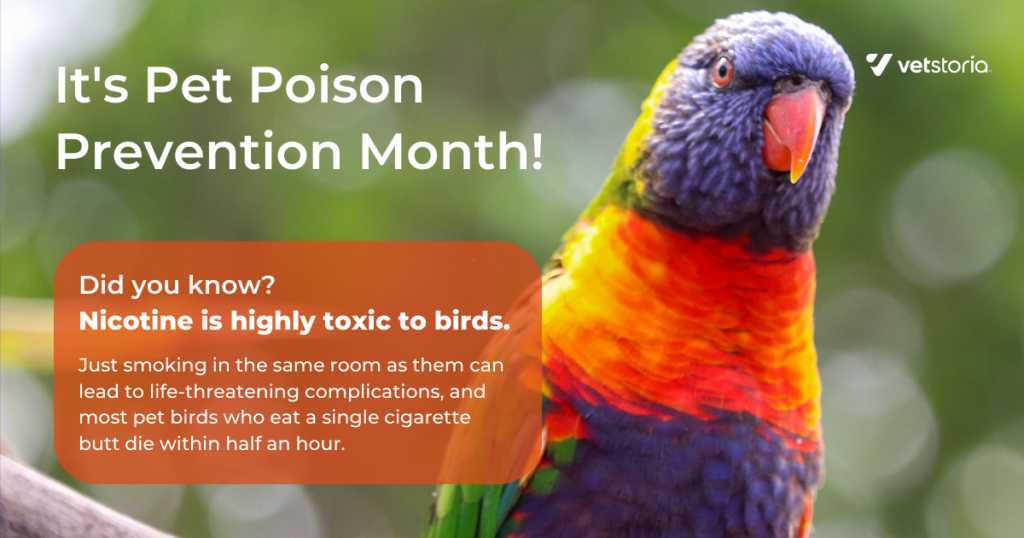
Beware of the following:
❄️ Antifreeze (ethylene glycol): Highly toxic and deadly for pets, even in small doses. Symptoms include incoordination, thirst, drooling, vomiting, drowsiness, lethargy, excessive urination, progressing to seizures, coma, and death.
🍬 Sweeteners (xylitol): Found in many human sweets, xylitol can cause low blood sugar and permanent liver damage in pets. Symptoms include vomiting, weakness, incoordination, lethargy, tremors, and seizures.
💊 Household Medicines: Over-the-counter medications like Ibuprofen or Paracetamol can be deadly to pets, causing liver and kidney damage. Keep them locked away and contact your veterinarian immediately if you think your pet has ingested them.
🐀 Rat Poison (anticoagulants): Symptoms may include lethargy, weakness, pale gums, breathing difficulties, lameness, black, tarry stools, blood in the urine, bruising, and bleeding. Contact your veterinarian for advice even if your pet seems fine.
💐 Lily (flower): Deadly for cats, lilies can cause vomiting, reduced appetite, drooling, lethargy, weakness, and kidney failure.
🪰 Insecticide (Permethrin): Used in dog-only flea treatments, permethrin can cause vomiting, fevers, seizures, and tremors in cats. Never use dog-only medicines on cats.
🫧 Cleaning products (Benzalkonium chloride): Common in disinfectants, benzalkonium chloride can be irritating to pets. Use diluted soap or bleach instead.
🧴 Bleach: Industrial bleach can cause chemical burns in pets, while household bleach can cause drooling and mouth irritation. Dilute with water and call your vet if your pet is showing symptoms.
Common symptoms include vomiting, drooling, incoordination, swelling of the mouth, abnormal body temperature, twitches and tremors, breathing difficulty, seizures, and passing out.
If your pet has been poisoned, immediately remove them from the source of the poison and call us on +44 1234 123 123 for advice, even if your pet seems fine.
Video Reel Template– If your team enjoys creating video reels, then you’re in luck! Show your clients how much you care by sharing these tips on pet poison. Our template shows you exactly what to capture in each shot – you just need to record it!
Email & Text Messages– In this template, we have suggested an email outline that you can follow to let your clients know about pet poison awareness month. Email is a great channel to engage your customers and build trust and loyalty. Our pre-written email gives pet owners important tips to keep their pets safe from toxic food. You can use it as is, or make it your own! It is a good practice to email your database from time to time with helpful tips so you can build a relationship with them between visits.
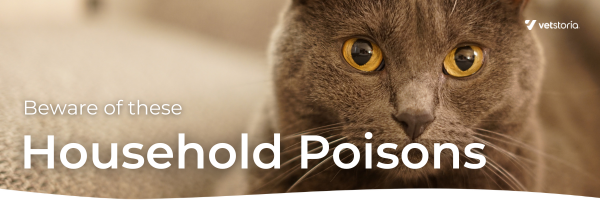
Email Banner– Use these email banners together with your emails to help you communicate with your clients professionally. You can use it as is, or make it your own! Simply choose the one that best suits your clinic! We have provided a range of options for you. To keep the transition effect in your email banner, select the ‘GIF’ file type when you download your design. To export a static email banner, simply download as a PNG or JPEG instead.
About the author
Aastha K Singhania
Aastha works as the Associate Marketing Manager at Vetstoria. She comes from a journalism background and loves to write as a hobby. When not at work, she can be found trying new recipes or designing Indian wear.

